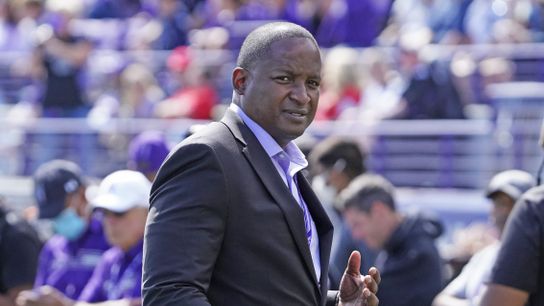In a nearly 20-minute sit-down interview with the Big Ten Network’s Dave Revsine, in which he was pressed as to why Northwestern leadership had been so publicly invisible, hadn’t released the third-party report into the school’s hazing scandal and how much damage had been done to the Northwestern brand, among other topics, Wildcats athletics director Derrick Gragg backed the school’s decision to fire football coach Pat Fitzgerald, refused to discuss the decision not to release the third-party report and likewise praised the school’s transparency.
At Big Ten Media Days Wednesday inside Lucas Oil Stadium in Indianapolis, Gragg was repeatedly pressed for answers into the scandal that has seen the school’s favored son Fitzgerald abruptly fired after an initial two-week suspension was first levied by Northwestern President Michael Schill.
Revsine directly asked Gragg what Fitzgerald should have known; asked Gragg if he had read the entire third-party report at the time Fitzgerald was first handed a two-week suspension; why Northwestern has steadfastly refused to release the third-party report by attorney Maggie Hickey of ArentFox Schiff.
-- “I was a part of the small team that delivered that message to Pat Fitzgerald,” Gragg said of informing Fitzgerald of the initial two-week suspension. “I was very involved initially.”
-- “We’re not discussing the report and the process. I want to be very careful about what I say on the report and the process on the record. … I can’t speak to that (refusal to release Hickey’s report), but it’s a private institution and again I don’t want to get into the details of the report.”
-- Gragg cited the “complexities of the legal situation that may be occurring” as to why Wednesday marked the first time that a high-ranking member of Northwestern’s athletics or academics hierarchy had conducted a public-facing interview.
In a pro move, Revsine swiftly pointed out that Gragg was speaking to the Big Ten Network despite those same ongoing legal complexities being present – if not compounded with additional lawsuits, as well as allegations of unacceptable behavior in multiple sports, having since surface.
“Those legal complexities still exist right now,” Revsine told Gragg, who responded, “Yes, they do.”
Gragg refused to answer if he had read the entirety of Hickey’s report at the time Fitzgerald was handed the two-week suspension, which three days later was replaced with Schill’s and the school’s decision to fire Fitzgerald.
So, what should Fitzgerald have known, and does Gragg share the sentiment that Fitzgerald deserved to be fired after the initial two-week ban?
“I certainly can’t speak to what I thought Coach Fitzgerald thought about what was going on in the program,” Gragg said. “That’s not a question I would be able to get into. …
“I obviously support the president and the decision that was made.”
Revsine then pressed Gragg on the status of current Northwestern football assistant coach Matt MacPherson, the Wildcats’s safeties coach who this week was personally named as being an assistant coach who witnessed acts of hazing inside the program.
“That situation, every employee, no matter if it’s a coach or university employee, is afforded due process,” Gragg said. “So that situation is being looked into and investigated and any other allegations that come forward or in the future will be heavily vetted. …
“We don’t have a timetable on Matt, but right now he’s still an assistant coach.”
Gragg, who touted his personal work history as setting himself apart with his compliance background because “unlike most athletic directors,” Gragg directed NCAA compliance offices at Arkansas, Michigan and Missouri, said he believed in being forthright with critical information – despite moments earlier having refused to simply answer if he had or had not read the entirety of the Hickey report when Fitzgerald was first suspended and also refused to disclose why Northwestern had itself not released the report.
“I believe in integrity and telling the truth and not burying the information,” Gragg said, after enumerating his compliance bona fides.
Gragg did tell Revsine, who asked about allegations that the Northwestern football culture had reportedly perhaps been out of control for some 30 years, that he was unaware of a single earlier complaint against the program before the email that triggered the internal investigation.
“To my knowledge, no (not aware of any prior or earlier complaints about the Wildcats’s football program prior to this self-report investigation,” he said.
Gragg has been Northwestern’s AD for almost 26 months; Schill its president for less than a year. Gragg noted that the two leaders “inherited a lot of these things, most of them. It’s our job to correct them.”
He also pushed back against how much damage had been done or what the perception should be of the Northwestern brand.
“I don’t want to paint a broad brush over everyone within the athletics department. I talked to the staff about this the other day, and they turned what was basically the best year in 15-16 years athletically and academically combined as an athletic program,” Gragg said, “but nobody is recognizing that because of what is going on.
“So, I really think that is the main culture we have. We have had situations that are challenging just like other universities.”
